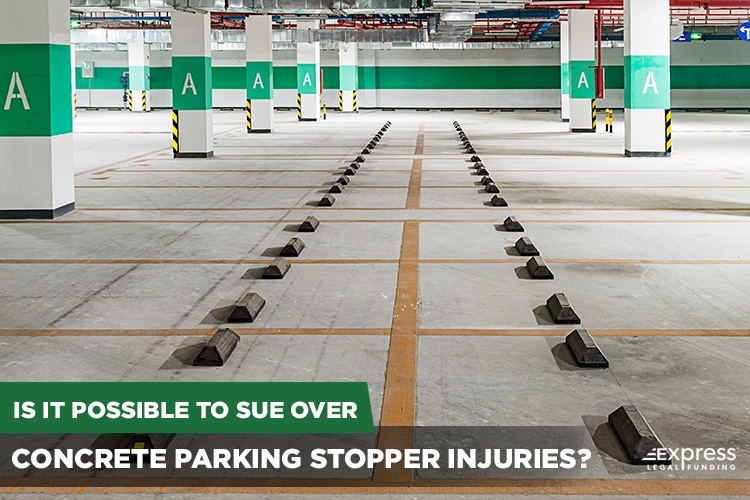
No one likes being injured, especially when they require more than the average first aid kit can offer or maybe even be severe enough to warrant medical attention from an ER.
These injuries often manifest from us suffering an accident of some kind.
Quite often, these accidents are unavoidable and seem the result of a stroke of bad luck or fate, as well as occur within the confines of our own homes or in public areas where no one is obligated to upkeep.
So there is really no one else to blame.
However, injuries can also be caused by accidents resulting from someone else failing to maintain their property and ensure it is safe for those who frequent the area.
This second type of accident and its location is critical since the injuries sustained could have been prevented by the property owner being more attentive and less negligent.
Nevertheless, defining what it takes for the property owner to be negligent and responsible for property liability is not simple, and there is confusion about what is considered negligence in the first place.
One area most people do not realize the concept of negligence applies to until it we are thrust into the situation is the hazard of parking lots, specifically dealing with the seemingly endless parking spaces.
This is a national issue, as parking lots go hand in hand with the outside of strip centers, outlet malls, and inside parking garages, big and small.
It’s common knowledge and understanding that strip malls and outside shopping plazas must have extensive parking, typically divided among many rows, to accommodate their shoppers.
City codes are in place to set these requirements.
The Danger of Slip and Falls From Wheel Stops in Parking Lots
Similarly, people have become accustomed to seeing concrete wheel stops and blocks used in many parking lots to divide parking spots and act as barriers between intersecting rows.
Unfortunately, these parking stoppers can fall into disrepair over time and present a threat to people around them since they are not in proper form.
This leads to the danger of trips and falls for people walking to and from their cars in parking garages and parking lots.
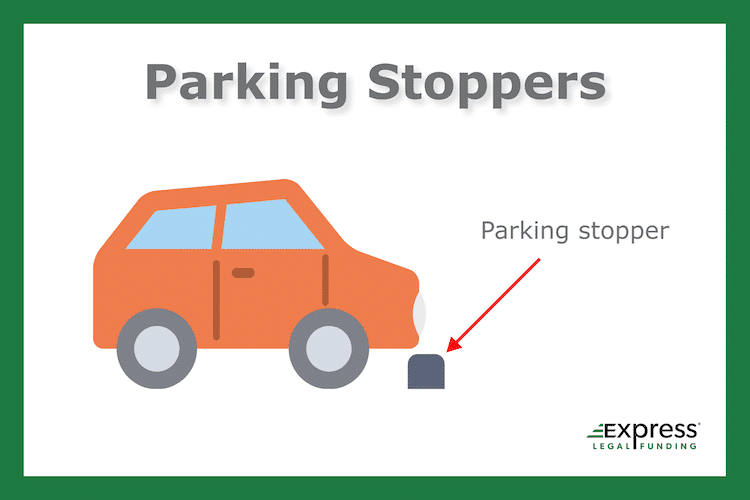
Damaged parking stops create tripping hazards leading pedestrians to fall, as even a small piece of the broken stopper (concrete, rebar, or loose rocks) becomes a hazard and results in serious injuries.
So when a slip and fall accident is caused by a faulty wheel stop in a parking lot, the injured victim is likely curious as to whether they can file a personal injury claim for the harm they suffered.
So let’s start by answering these questions and more about parking blocks and parking lot accident cases.
Can You Sue for a Parking Block Accident?
Yes, you can sue by filing a personal injury claim for the injuries and damages you suffered in a parking block accident.
However, the success of the parking lot lawsuit will depend significantly on the circumstances, which influence whether you can prove someone else is liable for causing the accident.
Before we discuss these details and concepts of premises liability law, let’s define what a parking block is in the first place.
What is a Parking Stopper?
Concrete parking stoppers, often referred to as “parking blocks,” “curb blocks,” or “wheel stops,” can typically be found in the innermost part of parking spaces nationwide.
They are designed to help drivers identify when to stop their vehicles without crossing into the opposing spot (or curb) and causing a parking lot accident.
While they are practical tools to help people avoid car accidents, they can also pose an issue to those who travel the parking lot on foot.
We have all been in scenarios where our attention is diverted from our walking path and redirected to something else.
Often that is because we were too focused on a conversation with a friend or family member or, increasingly more likely, focused on our cell phone instead of the path in front of us.
In rare circumstances, we can overlook the parking stoppers because it was obstructed from our line of sight, and we do not expect it as we turn a corner.
Regardless of the reason, parking blocks are a common tripping hazard that many have fallen victim to over the years.
While most parking lots have these parking stoppers, they are only sometimes required since the zoning laws for these stops are determined by state law.
For example, parking blocks are mandatory in all parking lots in California.
Conversely, Texas does not require parking wheel stops but recommends them in an advisory to ensure a safer perimeter for vehicles regarding accessible routes.
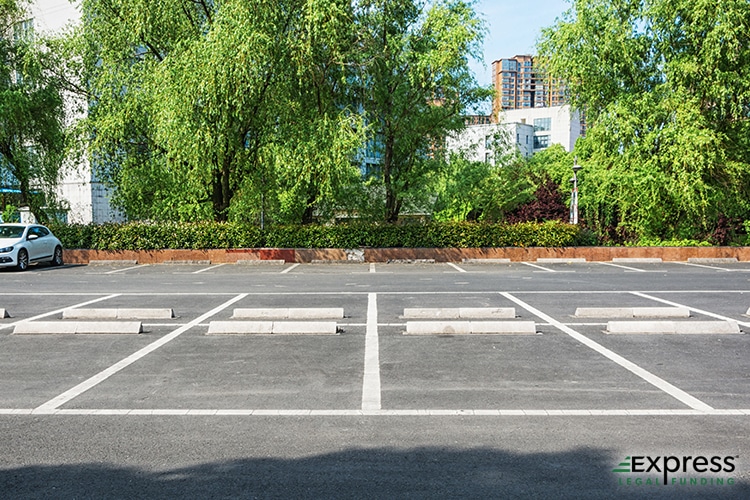
Parking blocks protect pedestrians by ensuring vehicles do not cross parking spot lines to reach a better position. Unfortunately, they are inherently obstructive and usually contain concrete to protect against damage, which can lead to damaging vehicles.
Their immovable weight makes it easier for people to trip over them while walking through the lot to their destination.
While most of these accidents are because the pedestrian was not paying attention, there are situations where the parking stopper placement is the cause.
However, the more common issue is when the parking block falls into disrepair and presents a threat to people who are forced to step over them to reach their destination.
When a parking stopper is damaged to the point of crumbling, it becomes a hazard since there are often loose pieces of concrete and rebar.
People forced to step on top of the damaged parking stopper to avoid someone else’s vehicle or reach the crosswalk safely might step on a loose piece of concrete and fall when it gives out.
Serious injuries can be caused by these falls, such as broken bones, lacerations, and even traumatic brain injuries (TBI) from the person falling and hitting their head.
The good news is there are legal options available. People with parking lot injuries can file a lawsuit to sue the property owner for an accident involving parking blocks to recover financially.
Although personal injury lawyers will do their best to give you legal advice and in-depth case review to help prove the wheel stop was damaged, it is no simple task.
A lot of time and effort goes into proving (or defending against) a parking lot lawsuit.
The primary issue is proving that the accident was because of problems with the parking block’s placement or condition rather than negligence on your part. Despite the difficulty, there has already been an instance where a parking stopper injury led to a successful lawsuit.
Example: Parking Block Lawsuits
The Appeals court case that led to a breakthrough in parking block lawsuits occurred four years ago in 2019.
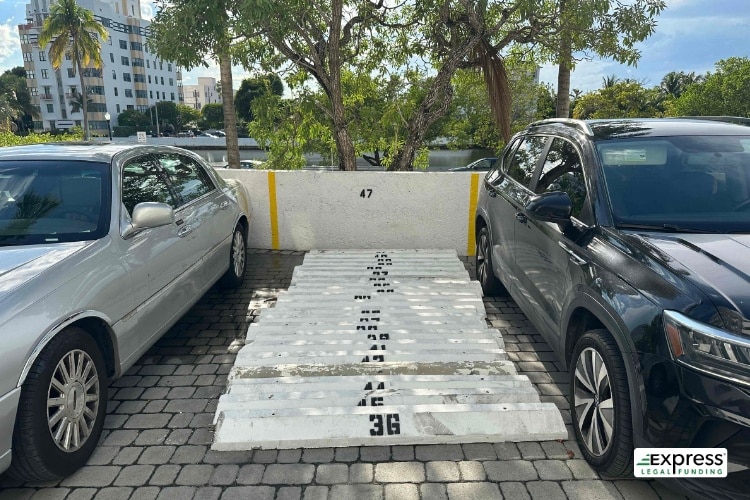
Sherrye Parker v. Shelmar Property Owners Association, Inc.
On June 21st, 2019, Florida’s Fifth District of Appeals District Court filed an opinion in favor of the appellant, a woman named Sherrye Parker, with an Oviedo, Florida premises liability claim involving the parking lot of the Appellee, Shelmar Property Owners Association, Inc., Karla Burgunder and Sheila Burgunder.
While traversing the parking lot, Parker tripped over a parking block and injured herself in the fall.
The unique situation regarding the parking stopper that Sherrye Parker tripped over is that it was erroneously installed in front of the pathway of ingress and egress.
That means the wheel stop was in the way of the walkway she needed to take to enter and exit the store.
Publicly accessible locations are meant to fall within a reasonable expectation of safety for the people who frequent the area.
Parker alleged that the placement of the parking stopper she tripped over breached the expected duty of care of Shelmar Property Owners.
Parker’s claim was predicated on asserting that the parking block was negligently placed where customers could trip over it despite their best efforts. While the parking lot met most safety standards, Parker was still injured due to the wheel stop’s location.
Regardless, Shelmar Property Owners, the appellant, denied fault against Parker’s allegations in hopes of getting the Appellate Court to uphold the lower court’s decision.
The appellant’s argument was the parking block was in an obvious location and within a clear line of sight; therefore, the accident was Sherrye Parker’s responsibility.
Because Appellee denied responsibility, Parker was forced to bring the complaint to a law firm and file a lawsuit against the store.
Although Sherrye Parker initially lost her parking block accident case with the trial courts decision, it was ultimately reversed by the Appellate judge who reviewed her case, agreed with
Location of the Wheel Stop Violated Building Code and Industry Safety Standards
Sherrye Parker’s expert witness’ Affidavit that the parking block’s placement location constituted a dangerous condition and was in violation of the Florida Building Code and industry safety standards.
The judge went on to give other reasons why he reversed the trial court’s verdict, including how a comparison to a 2013 parking lot case against Home Depot was flawed.
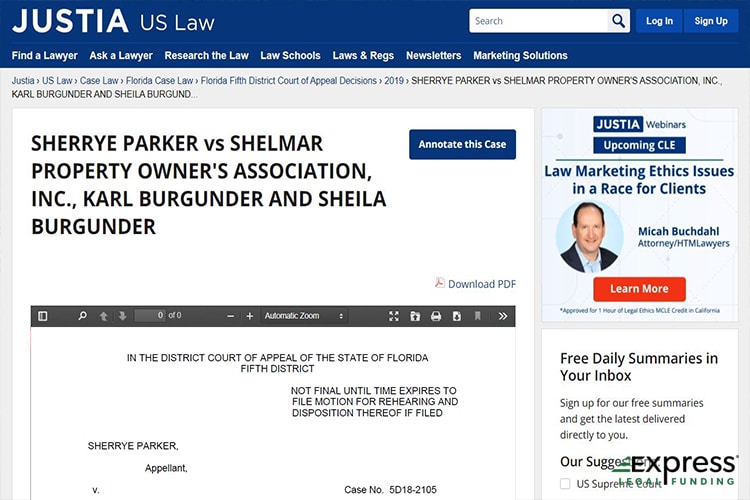
The cited claim involved a woman named Gudrun Ramsey and her husband, who lost a lawsuit they brought against Home Depot in Florida for her tripping and getting injured from a wheel stop at the front of the accessible parking space where she had parked her car.
The Appellate Court Opinion pointed out how the Dan Newlin law firm employed a forensic engineer for Sherrye Parker’s case, who identified parking lot issues, which violated Florida’s Building Code laws.
Ramsey v. Home Depot U.S.A., Inc.
Whereas, the case the trial court referenced, Ramsey v. Home Depot, did not have the testimony of the forensic engineer, which included actual code violations.
While Parker’s claim faced issues early on and lost in the trial court, Parker was able to appeal and ultimately succeed in having the summary judgment overturned and secured a jury trial for the fall injuries she sustained after tripping over the parking stopper.
This case’s success set a precedent for similar cases in Florida and can be applied to similar cases in other states.
These slip-and-fall cases are more likely to succeed in states where parking blocks, such as Texas, are not required by law.
In these states, the parking blocks could be identified as unnecessary hazards that only created a risk for those in the parking lot.
Despite this sentiment, it is essential to remember that these personal injury case verdicts are situational and could fail if the case is not strong enough.
Nevertheless, cases like “Parker v. Shelmar Property Owner’s Assn.” and “Ramsey v. Home Depot” are powerful precedents that prove such lawsuits can be filed successfully.
Who is Liable for Parking Lot Accidents?
Knowing who is liable for slip and fall injuries in a parking lot can be more complicated to determine than in other places because parking lots are usually attached to several buildings.
That can make it challenging to identify which commercial building or real estate company is responsible for the part of the parking lot in which you were injured.
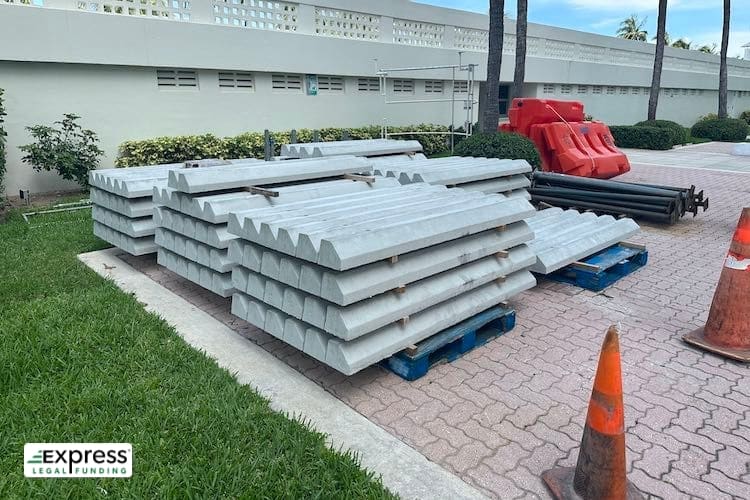
This might seem irrelevant, but liability for parking block injuries (like many slip and fall accident cases) typically lies with the parking lot’s owner due to premises liability law.
Fortunately, this situation is usually easy to navigate since plazas with multiple shops and business renters tend to have a single landlord who is also the property owner responsible for the parking lot and its upkeep.
Shopping centers, in many ways, are like apartment complexes for stores and business tenants, as they comprise multiple buildings. Each has units that the commercial tenants pay rent monthly for, so they have a place to perform services and sell their products.
While the stores are responsible for the upkeep and safe conditions of their businesses from within the walls of the units they rent, their rent fees are sent to the commercial property management company and property owner, who are responsible for the shopping plaza and its parking lot.
These shopping plazas are often owned by a real estate holding company that uses real estate agencies for marketing to companies to be tenants.
For example, if you think of your local shopping center with a grocery store, a few small restaurants, and other vendors, there is a good chance the units are all rented out and managed by a commercial real estate agency.
That company has the job of getting new tenants, managing the location, and collecting rent.
Shopping Center Property Owner is Responsible for Parking Lot Conditions
While the real estate property management company’s job is to keep the strip center operating under safe conditions, the upkeep of the shopping plaza and its parking lot still lies with the real estate holding company since it owns the property.
So too, this is the case for injuries caused by a parking stopper on the way to your local grocery store.
The responsibility to pay for your loss is not held against the grocery store where you were on your way to shop and instead can be claimed against the owner of the parking lot.
In addition to parking blocks hazards, there may be other factors and dangerous conditions involved in the parking area that can cause injury, such as:
Parking Lot Tripping Hazards:
- Potholes
- Wheel stops
- Poor lighting
- Missing safety signage
- Hazardous wheelchair ramps
- Loose rebar or sharp rocks
- Puddles
- Slippery oil patches
- Uneven pavement
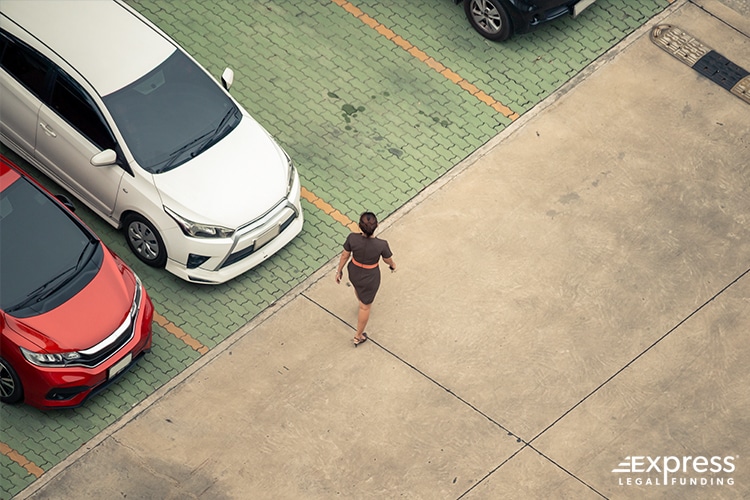
Fortunately, dealing with this other party is not an issue since it is possible to file a claim against them.
Generally, tracking this company down requires assistance from a personal injury law firm since they will make themselves hard to uncover as the owners.
They are the correct party to sue. Interacting with contacts outside their client or potential contact list is uncommon, especially when a potential lawsuit is involved.
Regardless, a legal claim against the responsible party is entirely possible, as proven by the Parker v. Shelmar Property Owner’s Assn. in Florida.
What is the Point of a Parking Lot Injury Lawsuit?
Suing over a slip and fall in a parking lot due to a poorly placed or maintained parking block is possible.
By filing the lawsuit with the help of a lawyer, you can win a settlement or trial verdict as monetary compensation for the cost of the injuries and damages you suffered.
You Should Hire a Parking Lot Accident Lawyer
Fortunately, you should not have to worry about paying for your personal injury lawyer up front to represent you on your parking lot accident case due to how these attorneys charge their fees.
The fee, often advertised as a “no win, no pay fee,” is a contingency-based fee.
That means your attorney and the law firm will get paid after you successfully recover money from your claim, which could be from a settlement or jury award.
The fee’s amount is based on a percentage of your settlement winnings, typically between 33% and 40% depending on whether you and your attorney decide to litigate your case.
Ultimately, this boils down to contingency fee-based attorneys allowing you to pursue financial justice via a civil lawsuit without having to risk your own funds in advance.
Your attorney can lead you each step of the way and help you decide whether it makes sense to settle out of court or file litigation.
That way, you can properly weigh the pros and cons by knowing the pitfalls and using that to decide upon your end goal.
Cause of Action for Parking Lot Accidents
The injuries caused by these negligent tort accidents give people the cause of action they need to pursue personal injury lawsuits against the parking lot owners they seek to hold responsible.
Negligent tort claims are one of the most common civil proceedings in the country and are designed to help victims recover financially.
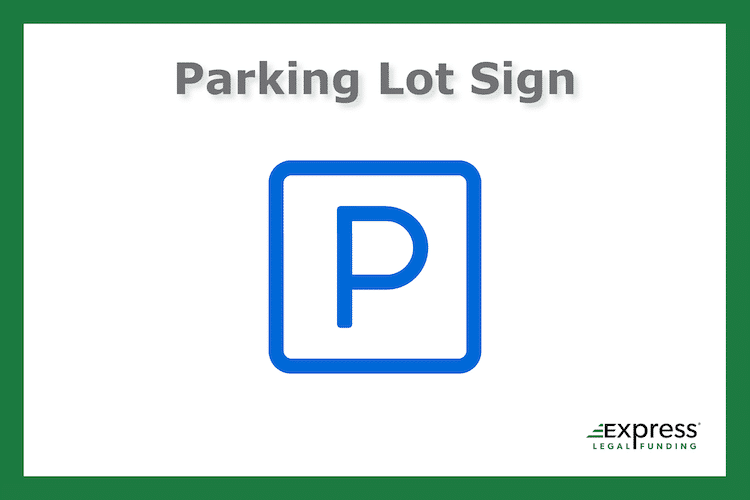
When we suffer serious injuries, we are put in situations that force us to seek medical attention, which is a costly problem in its own right, as the American health system is expensive.
While having health insurance and payment plans can help, parking lot accidents will surprise even the wealthiest with unexpected medical expenses and costs.
Depending on the injury’s severity, the treatment costs can compound and add up quickly.
That is why personal injury lawsuits are so important, as they allow both American citizens and noncitizens to hold the liable party responsible for paying them back for the medical expenses incurred from the injury.
Parking Lot Accident Lawsuit Settlement Amounts
That is why attorneys and insurance companies base personal injury settlement and demand amounts on the overall medical costs that you accumulate following an injury.
So too, is the case for the total sum of your medical bills serving as the baseline for the settlement the parking lot owner’s insurance company will offer.
Parking Lots Have High Commercial Policy Limits
While there are limits to what kind of settlement you will receive, your medical expenses directly affect the minimum amount.
Fortunately, when it comes to parking lot accidents involving slips and falls, the property owner’s insurance policy is commercial, so the policy limit could easily be $1,000,000.00 USD.
That makes it easier for your personal injury attorney to get a large settlement offer without needing to max out the policy, which is often not the case for minimum-policy car accident cases.

Be Truthful About Your Slip and Fall Injuries to Not Hurt Your Settlement
There is an expectation of honesty, as there should be when mediating a settlement. That means you should avoid reporting previous injuries as part of the incident.
Failing to uphold this obligation could destroy your claim and cost you what the fair settlement amount would have been.
Ultimately, a parking stopper injury lawsuit aims to ensure you recover financially from your injuries.
Most injuries in these scenarios are not severe, but some circumstances can exacerbate the injuries and mandate more intense medical treatment.
Closing Statements on Parking Lot Wheel Stop and Curb Accidents
Parking stopper injuries are rare since most parking lots are built to ensure the blocks are out of the main path and in their proper place.
Nevertheless, it happens that these wheel stops cause harm to those who fall victim to poor maintenance or positioning.
When these accidents affect people going about their daily lives, it can be frustrating and costly very quickly as the injuries can be severe, increasing the unforeseen financial burden.
This is all the more true as slip and fall injuries can result in people needing to miss work and have reduced paychecks. More expenses with less income are a severe issue.
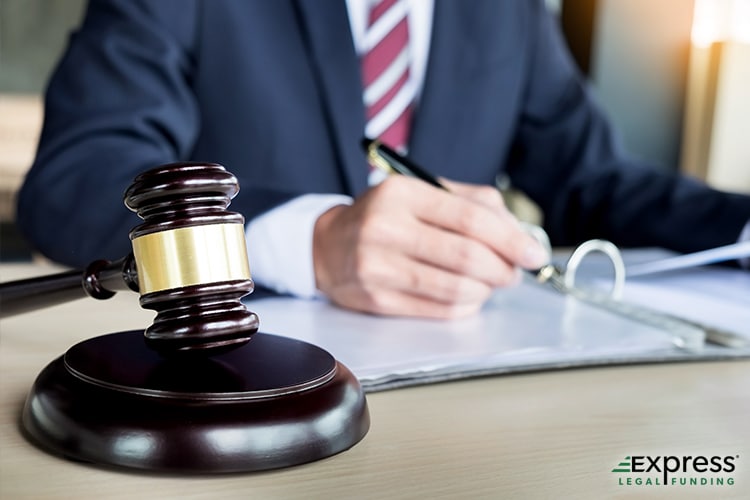
Pre-settlement Funding for Slip and Fall Injury Accidents
At Express Legal Funding, we understand this reality and the gravity of the situation. That is why we, as a trusted company offer pre-settlement funding. It is the main product and service we provide in assisting those who have filed civil lawsuits and are waiting for a settlement or trial award.
The non-recourse slip and fall accident funding we can advance is a sum of cash in exchange for the right to receive a portion of the potential case proceeds from the claim.
The money is yours to use as you see fit, except for paying for your attorney or case costs. The pre-settlement money is not a loan.
Instead, the lien is placed on the claim itself, so you don’t have to pay us back if you go to court and lose. The money is yours to keep.
That is what makes it non-recourse and worry-free.
(Important info for Missouri consumers: Please note that the type of financing we can provide to injured and damaged claimants in Missouri are recourse loans and, therefore, not risk-free advances contingent upon settlement or trial proceeds.
Pre-settlement loans and post-settlement loans in states like Missouri are recourse loans and must, technically, by law, be repaid. Express Legal Funding-Missouri, LLC is a loan company licensed to give these loans in MO.)
If you need financial assistance and have an ongoing parking lot accident lawsuit or a different type of personal injury claim, visit our website to learn more about lawsuit funding.
Plus, you can give us a call anytime to get the fast application process started. We are here to help!
